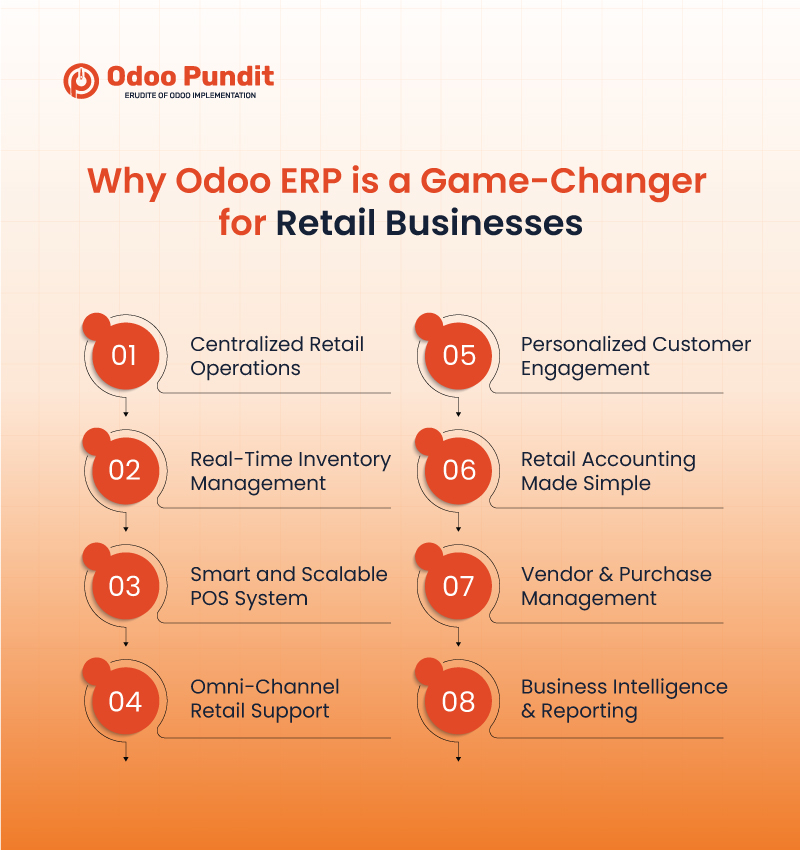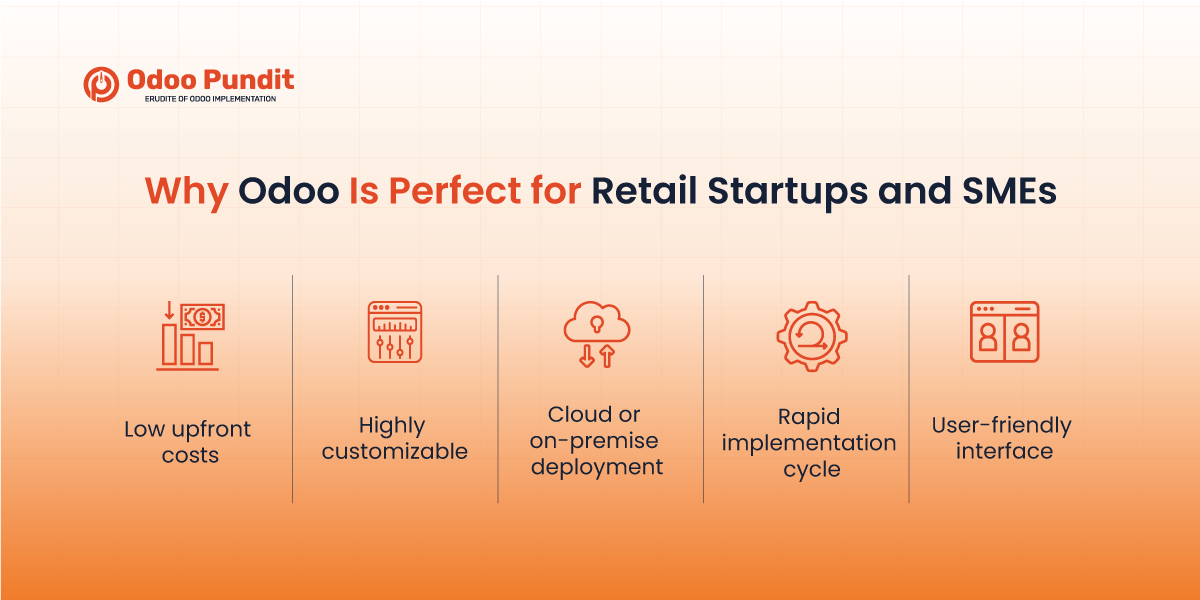Introduction
Retail businesses operate in a dynamic, fast-paced environment where consumer expectations, market trends, and competition evolve rapidly. In such a setting, operational efficiency, accurate inventory tracking, personalized customer experiences, and streamlined point-of-sale processes are no longer optional; they’re essential.
Odoo ERP is becoming a game-changer for retail businesses by integrating every retail function, sales, inventory, customer service, accounting, and even eCommerce, into a unified platform. Whether you run a chain of fashion stores or a local electronics shop, Odoo ERP helps you reduce manual work, make smarter decisions, and scale faster.
In this blog, we’ll explore how Odoo ERP is transforming the retail industry, the key modules that support growth, and why it's the go-to solution for modern retailers.
What is Odoo ERP for Retail?
Odoo ERP for retail is a modular, all-in-one business management system designed to centralize and automate every aspect of retail operations. It includes Point of Sale (POS), Inventory Management, Customer Relationship Management (CRM), Accounting, and more.
Unlike traditional retail software, Odoo offers real-time visibility, integration across departments, and the flexibility to customize workflows based on your unique business model. It’s available in both Community (free) and Enterprise (paid) editions, making it accessible for startups and enterprise-level retailers alike.
Core Benefits of Odoo for Retail:
- Real-time inventory visibility
- Fast and intuitive POS system
- Omni-channel retail support (online + offline)
- Customer loyalty and engagement tools
- Seamless integration with backend operations like purchasing and accounting
Why Odoo ERP is a Game-Changer for Retail Businesses

1. Centralized Retail Operations
Retailers often juggle multiple software tools for POS, inventory, CRM, and accounting. Odoo eliminates this complexity by offering a single system that connects all departments. Sales data feeds into inventory, inventory links with procurement, and customer interactions are tracked across every touchpoint.
Example: A customer buys a product online, Odoo automatically updates stock, adjusts accounting records, and logs the customer’s purchase history for future marketing.
2. Real-Time Inventory Management
Inventory mismanagement is a common growth bottleneck in retail. Overstocking increases holding costs, while understocking leads to missed sales.
Odoo’s Inventory module tracks product movements in real time, supports multiple warehouses, handles barcode scanning, and triggers automated reordering when stock hits minimum thresholds.
Result: Reduce stockouts, prevent over-purchasing, and free up cash flow.
3. Smart and Scalable POS System
Odoo’s Point of Sale app is designed for speed, simplicity, and performance. It works online and offline, offers multi-store management, supports various payment methods, and syncs data with inventory and customer records instantly.
You can even apply discounts, run promotions, print receipts, and track cashier performance, all from a sleek interface.
Use case: A clothing retailer opens a new branch. With Odoo POS, setup takes minutes, and all data integrates seamlessly with the main system.
4. Omni-Channel Retail Support
Modern retail is not just about brick-and-mortar; it’s about meeting customers wherever they shop. Odoo supports seamless integration between physical stores, online shops, and marketplaces.
With native integrations for Odoo eCommerce and connectors for Amazon, eBay, or Shopify, you can unify your inventory, pricing, and customer data across all channels.
Impact: Customers can buy online, return in-store, or vice versa, without operational headaches.
5. Personalized Customer Engagement
Retail success hinges on customer relationships. Odoo’s CRM and Marketing modules help retailers track customer behavior, segment users, automate marketing campaigns, and build loyalty programs.
From birthday offers to cart recovery emails, you can create tailored experiences that keep customers coming back.
Pro Tip: Use Odoo Loyalty programs to reward repeat customers with points, gifts, or discounts.
6. Retail Accounting Made Simple
Odoo Accounting automates invoice generation, tax calculations, payment follow-ups, and financial reporting. Since it’s integrated with POS and inventory, all financial data is automatically updated, eliminating manual entry.
You can view profit margins per product, track branch-wise performance, and make better budgeting decisions.
Bonus: Odoo supports localized tax structures, including GST for Indian retailers.
7. Vendor & Purchase Management
Retailers rely on vendors for a consistent stock supply. Odoo’s Purchase module lets you manage supplier contracts, automate RFQs (requests for quotations), track lead times, and compare vendor prices.
Coupled with inventory insights, Odoo can suggest optimal purchase quantities based on demand forecasting and sales trends.
Outcome: Smarter procurement and better vendor relationships.
8. Business Intelligence & Reporting
In retail, data is everything. Odoo offers real-time dashboards and advanced analytics across sales, stock levels, employee performance, customer behavior, and finances.
You can slice data by store, product category, season, or salesperson to uncover trends and opportunities.
Example: Discover which product lines drive the most profit during festive seasons and plan promotions accordingly.
How Retail Businesses Are Using Odoo in Real Life
Case: Multi-Outlet Fashion Brand
A growing fashion brand with five stores and an eCommerce site struggled with inconsistent inventory tracking and delayed customer updates. After switching to Odoo, they achieved:
- 98% stock accuracy
- Unified view of customer orders
- 40% reduction in operational overhead
Why Odoo Is Perfect for Retail Startups and SMEs

- Low upfront costs (especially with Odoo Community)
- Highly customizable
- Cloud or on-premise deployment
- User-friendly interface
- Rapid implementation cycle
Whether you’re launching your first store or expanding nationally, Odoo offers the flexibility and scalability retail businesses need to grow confidently.
Getting Started with Odoo ERP for Retail
Step 1: Identify your retail pain points
Inventory issues? Poor customer data? Start with the areas that need immediate attention.
Step 2: Choose essential modules
Most retailers begin with POS, Inventory, Sales, and Accounting. Add CRM, eCommerce, or Marketing as you grow.
Step 3: Work with an Odoo implementation partner
An experienced partner like Odoo Pundit can help customize Odoo for your retail needs, migrate your data, train your team, and ensure a smooth go-live.
Conclusion
In today’s hyper-competitive retail landscape, growth doesn’t happen by chance. Odoo gives retailers the clarity and control to scale with confidence. From small boutique stores to large retail chains, businesses are using Odoo to automate operations, engage customers, and make smarter decisions.
If you’re ready to power your retail journey with speed, precision, and customer-first innovation, Odoo ERP is the way forward.
Want to See Odoo in Action?
Get a free demo from our Odoo experts and discover how we can tailor the ERP to your retail business needs.